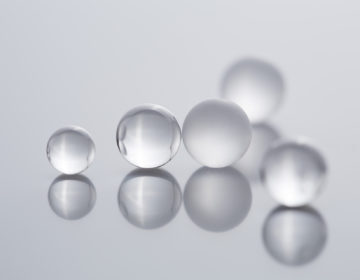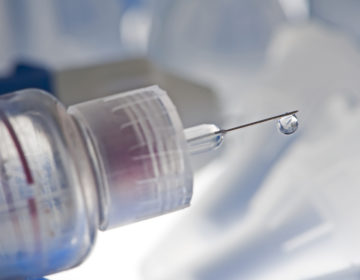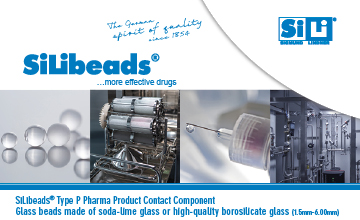SiLibeads® in direct contact with pharmaceutical and medical products
The use of SiLibeads® in the pharmaceutical sector requires compliance with all legal requirements of the target markets, verifiably effective quality management systems, highest precision, and purity of the product and the entire production process. State-of-the-art management methods, qualified and validated production and testing processes ensure that the high requirements of pharmaceutical companies are met. SiLibeads for the pharmaceutical industry can be cleaned according to customer requirements in special washing processes up to the classification RTS ready to sterilize.
Fields of application
Mixing insulin
SiLibeads® Type P Pharma Glass Beads are manufactured from borosilicate glass type I of the highest purity. These beads are produced with the utmost care in a certified process under clean room conditions in accordance with GMP guidelines and comply with ISO 9001 and ISO 15378 standards.
For more than 20 years, we have specialised in the production of glass beads used as primary packaging in 3 ml cartridges to mix insulin in suspension. We supply the global market with our product, 2.5 mm glass beads. Our production and processes are specially adapted to this specialised product. Optical sorting and control systems ensure the highest quality standards for our customers. Washing with high-purity water (WFI quality) enables our beads to be used directly by customers worldwide for “Ready to Sterilise” (RTS) applications.
The use of a glass bead with a diameter of 2.5 mm in an insulin cartridge has several important functions:
Mixing aid: the glass bead helps to mix the insulin efficiently, especially when dealing with insulin suspensions that need to be mixed before administration. By shaking the carpule, the glass sphere ensures an even distribution of the insulin, which is crucial for correct dosing.
Quality control: The glass bead can also be used as a quality control tool. Its movement within the cartridge can help the user to recognise whether the insulin has the correct consistency and is free of impurities.
Dosing control: In some designs, the glass sphere can also serve to facilitate dosing by allowing for consistent and accurate delivery of insulin.
Compatibility: Borosilicate Glass is chosen because it is chemically inert and does not react with the insulin. This is important to ensure the stability and effectiveness of the insulin. The glass is also made of the same material as the cartridge itself. The beads are therefore a primary packaging material.
The specific size of 2.5 mm is a result of design considerations based on the size of the cartridges, the viscosity of the insulin and the requirements for efficient mixing and administration.
Bead Beating
A common mechanical method for cell disruption uses glass, ceramic or steel beads of sizes 0.1 – 6.0 mm mixed with a sample suspended in aqueous media. The method is called “bead-beating”. Beads collide by agitation, stirring or shaking with the sample material, cracking open the cell to release intercellular components. The components range from different kinds of cellular materials, spores, animal and plant tissues. The advantages are the disruption of small sample sizes and a high number of samples at a time. The bead-beating process depends both on the machine, its parameters and the right selection of the bead material and size. Various bead-beating machines are available on the market and have rates of agitation from 2000 up to 20000 oscillations per minute. For such high oscillation rates high quality beads are necessary to prevent a contamination of the disrupted products by increased wear or broken beads.








